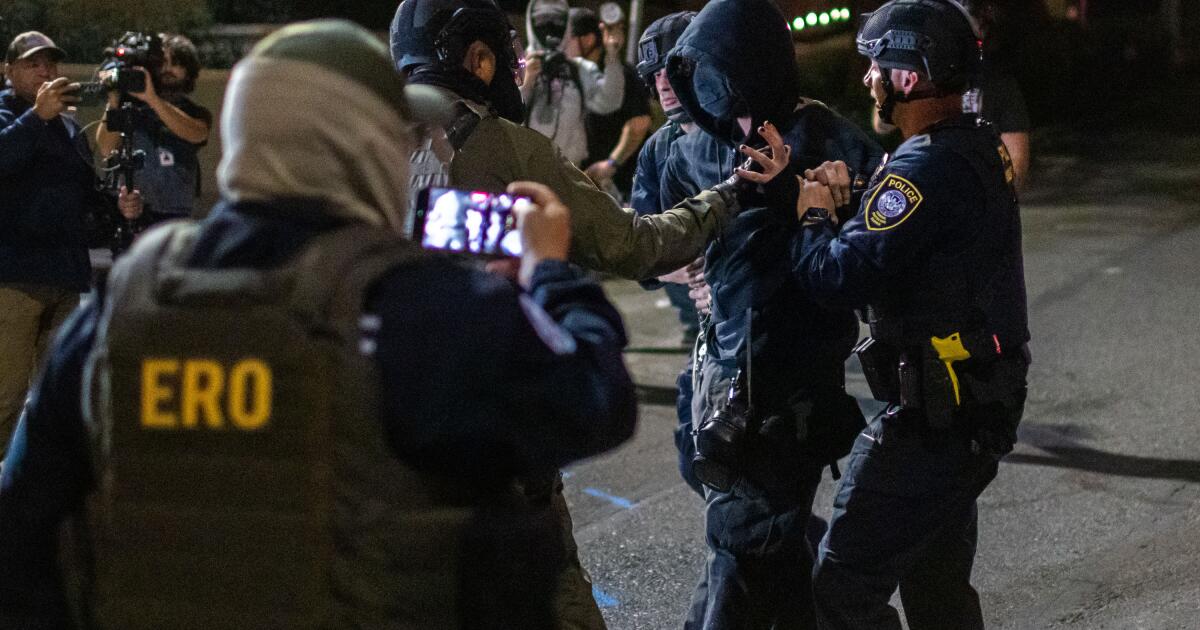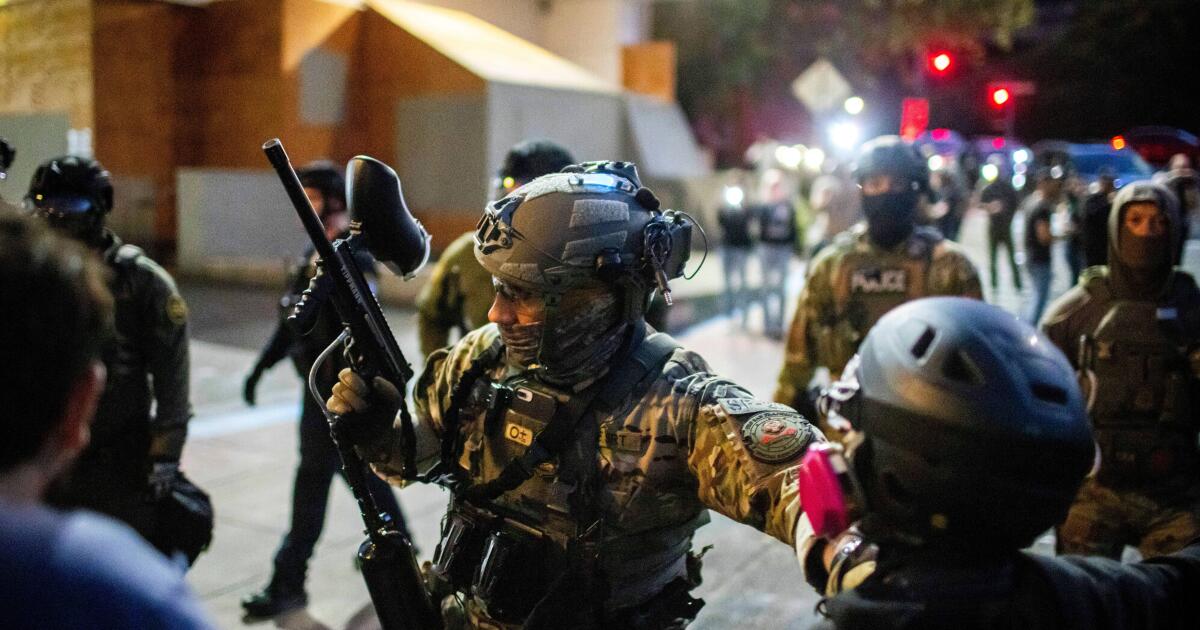Illinois urges judge to stop National Guard deployment after Trump administration ‘plowed ahead’
Illinois urged a judge Thursday to order the National Guard to stand down in the Chicago area, calling the deployment a constitutional crisis and suggesting the Trump administration gave no heed to the pending legal challenge when it sent troops overnight to an immigration enforcement building.
The government “plowed ahead anyway,” attorney Christopher Wells of the state attorney general office said. “Now, troops are here.”
Wells’ arguments opened an extraordinary hearing in federal court in Chicago. The city and the state, run by Democratic elected leaders, say President Trump has vastly exceeded his authority and ignored their pleas to keep the Guard off the streets.
Heavy public turnout at the downtown courthouse caused officials to open an overflow room with a video feed of the hearing. Chicago Mayor Brandon Johnson got a seat in a corner of the courtroom.
Feds say Guard won’t solve all crime
U.S. Justice Department lawyer Eric Hamilton said the Chicago area was rife with “tragic lawlessness.” He pointed to an incident last weekend in which a Border Patrol vehicle was boxed in and an agent shot a woman in response.
“Chicago is seeing a brazen new form of hostility from rioters targeting federal law enforcement,” Hamilton said. “They’re not protesters. There is enough that there is a danger of a rebellion here, which there is.”
He said some people were wearing gas masks, a suggestion they were poised for a fight, but U.S. District Judge April Perry countered it might be justified to avoid tear gas at a U.S. Immigration and Customs Enforcement building in Broadview, outside Chicago.
“I, too, would wear a gas mask,” the judge said, “not because I’m trying to be violent but because I’m trying to protect myself.”
Hamilton also tried to narrow the issues. He said the Guard’s mission would be to protect federal properties and government law enforcers in the field — not “solving all of crime in Chicago.”
Guard on the ground at ICE site
Guard members from Texas and Illinois arrived this week at a U.S. Army Reserve Center in Elwood, southwest of Chicago. All 500 are under the U.S. Northern Command and have been activated for 60 days.
Some Guard troops could be seen behind portable fences at the Broadview ICE building. It has been the site of occasional clashes between protesters and federal agents, but the scene was peaceful, with few people present.
Wells, the lawyer for Illinois, described the impact of Trump’s immigration crackdown in Chicago, noting that U.S. citizens have been temporarily detained. He acknowledged the “president does have the power, and he’s using that power.”
“But that power is not unlimited,” Wells added, referring to the Guard deployment. “And this court can check that power.”
Perry told the parties to return to court late Thursday afternoon.
Guard on court docket elsewhere
Also Thursday, a federal appeals court heard arguments over whether Trump had the authority to take control of 200 Oregon National Guard troops. The president had planned to deploy them in Portland, where there have been mostly small nightly protests outside an ICE building.
U.S. District Judge Karin Immergut on Sunday granted a temporary restraining order blocking the move. Trump had mobilized California troops for Portland just hours after the judge first blocked him from using Oregon’s Guard.
Two dozen other states with a Democratic attorney general or governor signed a court filing in support of the legal challenge by California and Oregon. Twenty others, led by Iowa, backed the Trump administration.
The nearly 150-year-old Posse Comitatus Act limits the military’s role in enforcing domestic laws. However, Trump has said he would be willing to invoke the Insurrection Act, which allows a president to dispatch active duty military in states that are unable to put down an insurrection or are defying federal law.
Troops used in other states
Trump previously sent troops to Los Angeles and Washington. In Memphis, Tenn., Mayor Paul Young said troops would begin patrolling Friday. Tennessee Republican Gov. Bill Lee supports the role.
Police Chief Cerelyn “CJ” Davis said she hoped the Guard would be used to direct traffic and have a presence in retail corridors, but not used for checkpoints or similar activities.
Davis said she doesn’t want Memphis to “feel like there is this over-militarization in our communities.”
The Trump administration’s aggressive use of the Guard was challenged this summer in California, which won and lost a series of court decisions while opposing the policy of putting troops in Los Angeles, where they protected federal buildings and immigration agents.
A judge in September said the deployment was illegal. By that point, just 300 of the thousands of troops sent there remained on the ground. The judge did not order them to leave. The government later took steps to send them to Oregon.
Fernando and Thanawala write for the Associated Press. AP writers Ed White in Detroit, Geoff Mulvihill in Philadelphia and Adrian Sainz in Memphis, Tenn., contributed to this report.

